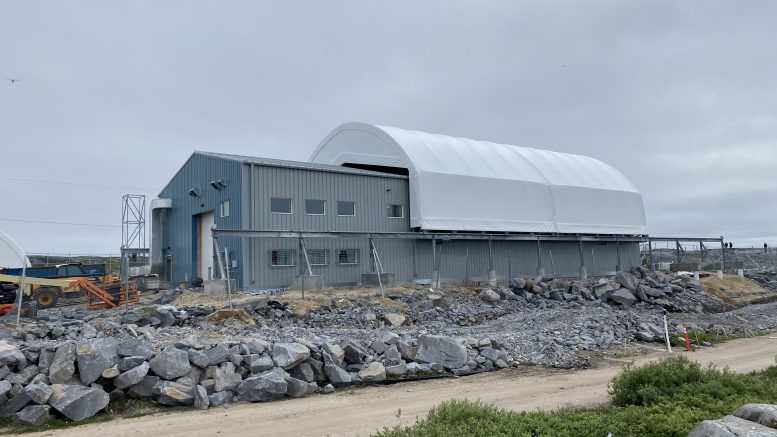On Sept. 20, the university filed a statement of defence and counterclaim in response to a lawsuit brought forward by Penn-co Construction at the end of August.
Penn-co was contracted to by the university to build the Churchill Marine Observatory (CMO) — a multidisciplinary research facility located in Churchill that received a grand opening on Aug. 27.
Three days later, Penn-co filed a lawsuit against the university seeking nearly $2.6 million in compensation. The company alleged that that the “the university has been unjustly enriched to the detriment of Penn-co” — a claim which the university denies.
The CMO project contract was entered in two phases with approximately $20.5 million in estimated fees. The phase 1 contract price was slightly over $14.6 million, while the phase 2 contract price was over $5.8 million.
Phase 1 was entered in 2017, entailing the construction of the main building, while phase 2 was entered in 2019, covering the construction of the pumphouse and pipeline from the CMO building nearby inlet of Hudson Bay.
In the defence statement, the university said that the phase 1 work reached a substantial performance on or about May 17, 2021, and phase 2 work on or about Nov 30, 2021. However, the university denied that Penn-co properly completed all phase 1 and phase 2 work in accordance with its contractual obligations.
The university also refuted all Penn-co’s claims of entitlement to additional compensation.
In response to their entitlement claim for compensation for COVID-19 protocols, the university, according to the defence statement, said that “any delays in Penn-co’s completion of the phase 1 work on account for laws, regulations, rules and standard and/or codes enacted by competent government authorities in response of the COVID-19 pandemic were not delays caused by the action of the university of consultant, or anyone engaged by them directly or indirectly.”
The university also disavowed the construction company’s claim for compensation on account of the process control panel, which they said was needed but was allegedly unavailable in the phase 1 contract documents.
The university’s response was that “the supply, installation, and operation of the process control panel was part of phase 1 contract work and that the supply, installation and operation of the process control panel were included in, or in the alternative, properly inferable form, the phase 1 contract document was marked therein in accordance with industry standards.”
“The university and the consultants [Prairie Architects Inc.] worked with Penn-co to modify the scope of Phase 1 work related to the process control panel so as to better conform with the shop drawings prepared by Penn-co,” read the response.
The university also claimed in their statement of defence that the geotechnical report prepared by KGS Group, an engineering consulting firm, entailed an accurate representation of the construction site. This was in response to Penn-co’s claim that the sand pockets encountered during drilling in phase 2 work was not specified in the geotechnical report.
According to the statement of defense, “the university denies that the report by KGS Group contained errors as alleged or at all, and further denies that the phase 2 contract documents contained any inaccurate representation as alleged or at all.”
The university stated that “pursuant to the phase 2 contract, Penn-co was required to, and did, select the methodology by which it would complete the drilling that formed part of the phase 2 work, and that Penn-co and/or its subcontractor elected to employ a dry-drilling methodology.”
The final statement of defence was in response to the plaintiff’s lawsuit claim that the department of fisheries and ocean (DFO) delayed the assessment of the project.
According to the university, “KGS Group, a firm of engineers, acting at the behest of the university, undertook and completed said self-assessment and determined that a review by the DFO was not necessary in the circumstances as the project would not cause serious harm, satisfying the applicable regulatory requirements.”
The university clarified that Penn-co did not reach out to their consultant or KGS Group to find out whether a self-assessment of the job site had been completed or if a review by the DFO was necessary.
“The university says that, on account of the timing of the tender and the dates upon which KGS carried out the self-assessment, a review by the DFO was unnecessary,” read the defence statement.
U of M counterclaim against Penn-co
In their counterclaim, the university stated that “Penn-co breached its obligation under the phase 1 contract and/or phase 2 contract, including any deficiency repair work and the common law duties it owed to the university.”
The counterclaim alleges that the university discovered several issues within the CMO facility, including pumphouse issues, fabric roof issues, heat trace issues and other deficiencies.
And even though the university and its consultant reached out to Penn-co and requested a remedy for the deficient work, Penn-co neglected their request, according to the counterclaim.
The university claims to have suffered several damages in an amount that will be proven at a trial due to Penn-co’s breaches and incompetency.
“Penn-co knew, or ought to have known, that the university was relying upon Penn-co to complete its work under the phase 1 contract and the phase 2 contract, including all required warranty and remedial work, in a good and workmanlike manner, in accordance with the phase 1 contract documents and phase 2 contract documents, and in accordance with its duties, contractual or otherwise,” read the counterclaim.

